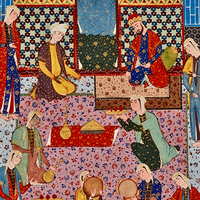Loading AI tools
8th century Vizier of Harun al-Rashid's Court From Wikipedia, the free encyclopedia
Jaʽfar ibn Yahya Barmaki or Jafar al-Barmaki (Persian: جعفر بن یحیی برمکی, Arabic: جعفر بن يحيى, Jaʽfar bin yaḥyā) (767–803), also called Aba-Fadl, was a Persian vizier of the Abbasid caliph Harun al-Rashid, succeeding his father (Yahya ibn Khalid) in that position. He was a member of the influential Barmakid family, formerly Buddhist leaders of the Nava Vihara monastery. He was executed in 803 at the orders of Harun al-Rashid.
Jaʽfar ibn Yahya جعفر بن يحيى | |
|---|---|
 Detail of a miniature illustrating an anecdote in which the power and influence of Jaʻfar ibn Yahya (crowned figure) is pointed out. Folio from a manuscript of Nigaristan, Iran, probably Shiraz, dated 1573-74 | |
| Born | c. 767 Khorasan, Abbasid Caliphate |
| Died | c. 803 Abbasid Caliphate |
| Cause of death | Execution on the orders of Caliph Harun al-Rashid |
| Other names | Aba-Fadl |
| Occupation | Abbasid vizier |
| Years active | c. 798 – 803 |
| Era | Abbasid |
| Parents |
|
He had a reputation as a patron of the sciences, and did much to introduce Indian science into Baghdad.[1] He was credited with convincing the caliph to open a paper mill in Baghdad, the secret of papermaking having been obtained from Tang Chinese prisoners at the Battle of Talas (in present-day Kyrgyzstan) in 751.[citation needed]
Jaʽfar also appears (under the name of Giafar in most translations) along with Harun al-Rashid in several Arabian Nights tales, often acting as a protagonist. In "The Three Apples" for example, Jaʽfar is tasked with solving a murder, whereas in "The Tale of Attaf", Jaʽfar is more of an adventurer.
More recent media inspired by the Arabian Nights has portrayed Jaʽfar as both a villain and a sorcerer:
| ||||||||||||||||||||||||||||||||||||||||||||||||||||||||||||||||||||||||||||||||||||||||||||||||||||||||||||||||||||||||||||||||||||||||||||||||||||||||||||||||||||||||||||||||||||||||||||||||||||||||||||||||||||||||||||||||||||||||||||||||||||||||||||||||||||||||||||||||||||||||||||||||||||||||||||||||||||||||||||||||||||||||||||||||||||||||||||||||||||||||||||||||||||||||||||||||||||||||||||||||||||||||||||||||||||||||||||||||||||||||||||||||||||||||||||||||||||||||||||||||||||||||||||||||||||||||
Seamless Wikipedia browsing. On steroids.
Every time you click a link to Wikipedia, Wiktionary or Wikiquote in your browser's search results, it will show the modern Wikiwand interface.
Wikiwand extension is a five stars, simple, with minimum permission required to keep your browsing private, safe and transparent.